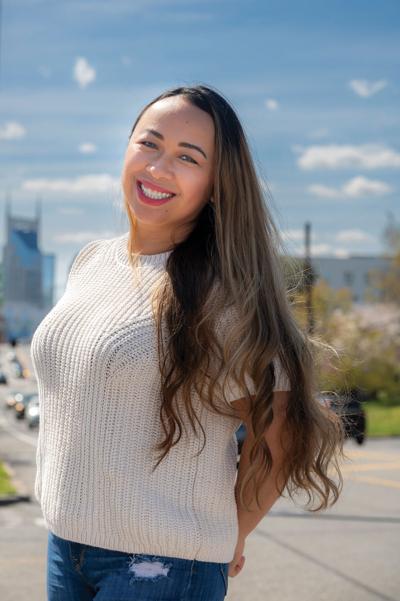
Sarong Vit-Kory
Sarong Vit-Kory was born in 1982 in the Khao I Dang refugee camp in Thailand. Four years later, her family resettled in Nashville. For Vit-Kory, her parents and her five siblings, the city became a home and a refuge. She learned English at school and church, and her father worked at the Opryland Hotel.
Vit-Kory comes across as resolutely buoyant and enterprising. After graduating from MTSU, she spent time in Cambodia, carried her bilingual skills back home, and became a dogged advocate for Nashville’s Cambodian refugee families. She helps them navigate citizenship applications and doctor’s appointments, cares for her mother, and takes the Buddhist monks on outings. “You can negate evil with goodness,” she says, “and being compassionate.” The Scene spoke with Vit-Kory about growing up in Nashville’s small Khmer community.
What’s your first memory?
In the camps. I remember walking barefoot with my sisters in a sandy, dusty area. My mother was cooking, and she said, “Go find your father. Tell him to come home.”
What are some early memories of Nashville?
We lived in Cayce Homes. Some other Cambodians stayed in the Fatherland and Boscobel areas, and on South Ninth. They were our “phums” — “phum” means village — like back in Cambodia. Everyone would gather at the phums and eat, drink, play games and sing karaoke. There were two or three weddings every summer — very festive. Romvong [traditional folk-dance music] was a glimpse of our parents’ lives before the war.
Where did you go to school?
We Cambodians went to Cora Howe Elementary, and then Bailey Middle. We spoke Khmer while we were learning English. Then Metro said everyone had to go to their zoned schools. After fifth grade, I was in class with no Cambodians. We lost our fluency. This affected our relationship with our parents, who only knew Khmer.
Where did you worship?
In the 1980s, the community was very centered around the Belmont Baptist Church. There was a Cambodian pastor there. Wednesday nights, a bus picked us up at the phums. I was in the choir. That’s when I learned that I love to sing. I’m crazy about Christmas carols.
My parents didn’t talk about Buddhism. Really, the basis for life then was just to get by, to save money, to raise your kids, and just work.
Why did you visit Cambodia?
I got a degree in international relations and wanted to learn more about developing countries, for my career. I also wanted to learn Khmer so I could communicate with my parents and be closer to them.
Going to Cambodia helped me remember that Cambodian girl I was in elementary school. When I would go to the temple and hear the chanting, I felt the physical and spiritual world come together. It became a part of my identity as a Cambodian Buddhist woman.
Did you understand what your parents had been through during the Khmer Rouge regime?
I always knew they came from a war. I didn’t understand the kind of atrocity it was. It’s something I didn’t grow up hearing about. You’d maybe hear the words “Pol Pot” or “Khmer Rouge” while people were drinking together. And my mother, who is mentally disabled, would say certain words to herself in Khmer, like “Communi! Communi!” I realized later, when I went to Cambodia, that she was saying the word “communists.”
Did your mother tell you anything about that time?
She always said she sewed the black uniforms for the Khmer Rouge. Then about 10 years ago, someone asked her, “Tell us, please, sister. Be honest. What did you do during the war?” It turns out, she had to collect and count the rice that was being shipped to a factory and probably on to China. Not by choice. Of course, she had to do it. The reason she lied was, she said, “Never tell the truth, or you can get killed.”
Everyone went through the war. But a few people got extremely traumatized. I think my mother got it the worst. She hears voices at night, so I’ll comfort her. It’s a cry of suffering, a cry of loneliness.
What drives you to be a caretaker for your family and community?
I think I was always a little Buddhist girl and didn’t even know it. Because when I was 7 or 8, I made a decision: I just want to do good.
I think everyone has a little Buddha in them. You and I are the same. We’re human. Your joy is my joy.
What does the American Dream mean to you?
My father was a farmer. He never imagined what his country would go through, and that he would have to leave everything that he knew. For the rest of his life, he used his bare hands to provide for his family. But it was such a life of meaning for him.
Every family has its problems, but we do everything together. That’s how we create meaning. Success is finding meaning with people you love in your life. We’ve been replanted in a new land, and we’ve been able to survive with each other. It’s a story of the human spirit. We are so infinite. We are so much stronger than we think we are. And the Cambodian community in Nashville is an example of that. They are survivors.
Stories of who these Nashvillians were, who they are now, and who they’re still becoming






